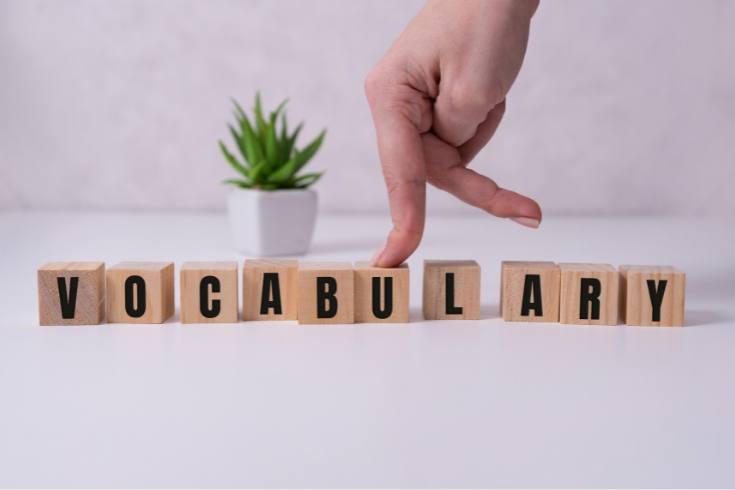Practising the pronunciation of recent phrases is a scientifically-backed and extremely efficient methodology for increasing your vocabulary and guaranteeing long-term retention. Have you ever ever discovered a brand new, thrilling phrase, solely to neglect it every week later or really feel hesitant to make use of it in dialog?
This frequent frustration typically highlights a lacking piece within the studying course of: the essential hyperlink between seeing a phrase and confidently talking it. Pronunciation observe, within the context of vocabulary constructing, is the lively strategy of partaking with a brand new phrase’s sounds, rhythm, and stress patterns, thereby creating a robust auditory and bodily connection that cements it in your reminiscence.
On this complete information, we’ll discover the cognitive science behind why saying phrases aloud enhances reminiscence recall. We’ll then offer you sensible, step-by-step pronunciation workout routines designed to grasp new vocabulary, introduce highly effective digital instruments to good your accent, and present you the best way to construct a constant observe routine.
Prepare to rework your studying methodology from passive memorization to lively possession and begin utilizing a wider, extra subtle vocabulary with fluency and confidence.
Why Is Pronunciation the Secret Grammar Software for Remembering New Phrases?

Studying new vocabulary can typically really feel like amassing stunning, unique objects and inserting them behind a glass show case. You possibly can see them and admire them, however you possibly can’t contact or use them.
That is the expertise of passive studying—recognizing a phrase while you learn it however being unable to retrieve it for lively use in speech. The answer is to interrupt the glass, and the hammer is pronunciation.
If you solely learn a phrase, you have interaction one major sense: sight. However while you observe saying it aloud, you activate a robust trio of cognitive processes that hardwire the phrase into your mind.
- Energetic Recall: Merely attempting to say a phrase forces your mind to actively retrieve data somewhat than passively acknowledge it. This wrestle is sweet; it strengthens the neural pathways related to that phrase, making it far simpler to recall throughout an actual dialog.
- Auditory Suggestions: Listening to your self communicate the phrase creates an auditory loop. Your mind hears the sound, processes it, and compares it to the proper model you’ve heard. This self-correction course of is a essential a part of studying and deepens your understanding of the phrase’s phonetics.
- Muscle Reminiscence: The bodily act of shaping your mouth, tongue, and lips to type a brand new sound creates muscle reminiscence. Similar to training a tennis swing or a piano chord, repeating the bodily motions of pronunciation makes them automated. This kinesthetic hyperlink is extremely robust and connects the summary idea of a phrase to a concrete bodily motion.
Consider this as the muse of spoken grammar. Earlier than you possibly can place a phrase accurately right into a sentence (syntax), you could be capable of produce it accurately (phonetics). A phrase which you could pronounce is a phrase that you should utilize. A phrase that you should utilize is a phrase that you’ll bear in mind.
How Does Phrase Stress Change a Phrase’s Grammatical Perform?

In English, pronunciation isn’t nearly sounding clear—it’s typically a essential element of the grammar itself. Some of the necessary and sometimes ignored features of English pronunciation is phrase stress, which refers back to the syllable in a phrase that’s given probably the most emphasis.
Altering the stress can fully change the phrase’s which means and, crucially, its grammatical position as a noun, verb, or adjective.
Mastering this idea is like unlocking a cheat code for English grammar. Many two-syllable phrases in English observe a easy sample: if the stress is on the primary syllable, the phrase is probably going a noun or an adjective. If the stress is on the second syllable, it’s possible a verb.
Let’s take a look at some highly effective examples:
REC-ord (noun) vs. re-CORD (verb)
- REC-ord (stress on RE): That is the noun, a factor that comprises data.
- Instance: “The clerk filed the REC-ord within the cupboard.”
- re-CORD (stress on CORD): That is the verb, the motion of storing data.
- Instance: “Please re-CORD the minutes of the assembly.”
CON-duct (noun) vs. con-DUCT (verb)
- CON-duct (stress on CON): That is the noun, which means conduct or the act of managing one thing.
- Instance: “Her skilled CON-duct was exemplary.”
- con-DUCT (stress on DUCT): That is the verb, the motion of main or finishing up one thing.
- Instance: “The scientist will con-DUCT the experiment tomorrow.”
PRE-sent (noun/adjective) vs. pre-SENT (verb)
- PRE-sent (stress on PRE): That is the noun (a present) or the adjective (to be in a specific place).
- Instance (noun): “She obtained an exquisite PRE-sent for her birthday.”
- Instance (adjective): “All college students have to be PRE-sent for the examination.”
- pre-SENT (stress on SENT): That is the verb, the motion of giving or displaying one thing.
- Instance: “The group will pre-SENT their findings to the board.”
By training the proper stress, you aren’t simply refining your accent; you might be studying and reinforcing basic grammar guidelines that govern how phrases operate in a sentence.
What Are the Most Efficient Pronunciation Workout routines for Vocabulary Constructing?

Understanding why pronunciation issues is step one. The following is taking motion with confirmed strategies that construct good habits and ship outcomes. Listed below are three of the simplest workout routines you can begin utilizing immediately to supercharge your vocabulary constructing.
How Can You Use the ‘Pay attention, Repeat, File, Evaluate’ Methodology?
This foundational method is straightforward, highly effective, and builds a robust suggestions loop for self-correction. It breaks down the training course of into 4 manageable steps.
- Pay attention: Discover your new vocabulary phrase in a dependable on-line dictionary like Merriam-Webster or Collins. Play the audio pronunciation a number of occasions. Shut your eyes and focus solely on the sound. Discover the rhythm, the confused syllables, and any difficult vowel sounds.
- Repeat: After listening a number of occasions, attempt to say the phrase aloud. Mimic the sound as intently as you possibly can. Don’t fear about perfection but; simply deal with imitation.
- File: Use the voice memo app in your cellphone to document your self saying the phrase 3-5 occasions. Talking right into a microphone can really feel completely different, and this step captures the way you really sound.
- Evaluate: Play the unique audio from the dictionary, then instantly play your personal recording. What are the variations? Is your phrase stress in the precise place? Are your vowels sharp sufficient? This direct comparability offers prompt, clear suggestions for enchancment.
How Does the ‘Shadowing’ Method Enhance Pure Speech?

Shadowing is a extra superior method good for bettering total fluency, rhythm, and intonation. It includes listening to a brief audio clip of a local speaker and talking together with them on the similar time, attempting to match their tempo and pitch as intently as attainable.
Consider it like being a linguistic shadow. You’re not simply repeating after them; you’re attempting to talk with them. This train is extremely efficient for vocabulary as a result of it forces you to make use of new phrases within the context of pure, related speech somewhat than as remoted items.
Begin with slower audio clips, like from a podcast or audiobook designed for language learners, and step by step work your means as much as sooner, extra pure conversations.
How Can Breaking Phrases into Syllables Make Them Simpler to Study?
Lengthy, multi-syllable phrases may be intimidating. “Etymological,” “procrastination,” “ubiquitous”—these phrases can appear to be an not possible mountain to climb. One of the best ways to overcome them is to interrupt them down into smaller, manageable hills: their syllables.
- Look it up: If you encounter a brand new, lengthy phrase, look it up in an internet dictionary that exhibits the syllable breaks (e.g., pro-cras-ti-na-tion).
- Clap it out: Say the phrase slowly, clapping as soon as for every syllable. This helps you are feeling the rhythm and internalize the phrase’s construction.
- Concentrate on the stress: Establish which syllable receives the first stress (in “procrastination,” it’s “-na-“). Apply saying the phrase once more, placing additional emphasis on that single syllable.
This deconstruction methodology removes the concern issue and helps you construct the phrase from the bottom up, guaranteeing a extra correct and assured pronunciation.
What Digital Instruments Can Assist You Good Your Pronunciation?

Consistency is essential, and fortunately, we reside in an age with numerous digital sources at our fingertips. Integrating a couple of high-quality instruments into your routine can present prompt suggestions and structured observe.
- On-line Dictionaries with Audio: These are non-negotiable. Web sites like Merriam-Webster, Collins Dictionary, and Forvo (which offers pronunciations from a number of native audio system) must be your first cease for any new phrase. They supply each American and British pronunciations and sometimes embrace phonetic spellings.
- Language Studying Platforms: Complete platforms typically have built-in speech recognition expertise that will help you observe. For a wider vary of phrases and steerage on the best way to pronounce them accurately, devoted language studying platforms can supply structured workout routines and prompt suggestions in your accuracy.
- Devoted Pronunciation Apps: Apps like ELSA Communicate (English Language Speech Assistant) use synthetic intelligence to behave as a private pronunciation coach. It listens to you communicate and offers extremely particular suggestions on which sounds you’re getting proper and unsuitable, proper all the way down to the phoneme degree.
- YouTube and Podcasts: Discover creators who deal with pronunciation. Channels like ‘Rachel’s English’ or ‘Pronunciation with Emma’ supply extremely detailed video classes on all features of English pronunciation, from particular person sounds to the rhythm of complete sentences.
Conclusion
Finally, integrating pronunciation observe into your research routine isn’t just an add-on; it’s a basic technique that transforms vocabulary acquisition from a passive act of memorization into an lively, lasting talent.
It creates a robust connection between your thoughts, your ears, and your voice, guaranteeing that the phrases you be taught aren’t simply acknowledged however are prepared for use with confidence.
By understanding the cognitive science of lively recall, mastering grammatical phrase stress, and utilizing highly effective strategies like shadowing and the ‘Pay attention, Repeat, File, Evaluate’ methodology, you might be equipping your self to not simply be taught new phrases, however to personal them.Don’t let one other new phrase slip out of your reminiscence. Select one method from this information, choose a phrase you’ve struggled with, and spend the following 5 minutes saying it aloud. Begin immediately and really feel the distinction in your confidence and language fluency.


Leave a Reply